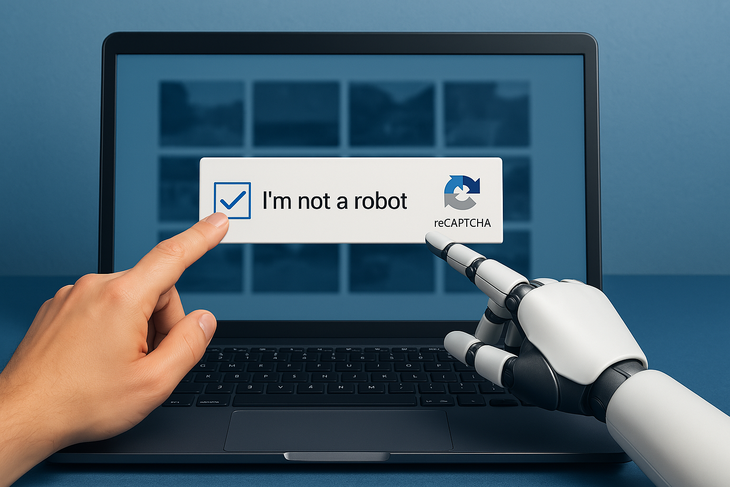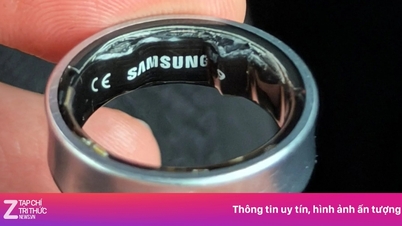
Captcha helps the website distinguish between human and machine visitors.
Many websites today require users to verify that they are real people through Captcha. This is to prevent automated systems from impersonating real users to gain access indiscriminately.
Few people know that behind the familiar confirmation boxes, Google is using technology to observe behavior and make judgments without users realizing it.
Data surrounding a click
You see a little box with the words 'I'm not a robot'. You think you can pass the check with a simple click. But in fact, at that moment, Google starts observing your actions.
Specifically, the system records how you move the mouse to the confirmation box: is the path natural, is the speed even or is it a bit jerky like a real person's hand. Then the way you click, do you hesitate for a few seconds or click decisively like a machine.
Even the time you spend on the page, how many times you scroll up and down, and whether you type on the keyboard or not, is tracked.
Because automated software is often extremely precise and consistent, Google relies on small human details like hand movements, pauses, or slow reactions to recognize you as a real person.
No Captcha shown , but you are still being tested
There are websites you visit that are completely seamless, with no 'I'm not a robot' checkbox or any images asked of you. But that doesn't mean you have free reign to skip verification. In fact, you're still being checked, just in a more subtle way.
Google calls it reCAPTCHA v3. This version doesn’t require any interaction from you. Instead, the system automatically tracks your behavior as soon as you land on the page: how you move your mouse, when you type, how naturally you scroll. Every action is analyzed and assigned a score between 0 and 1. The closer it is to 1, the more likely you are a human.
The site will use that score to decide whether to let you continue. If your score is too low, you may be blocked, sent to another verification step, or forced to do the familiar Captcha. It all happens silently, without you even realizing it.
When software tries to act like a real person
It’s not just humans who are trying to bypass verification. Many automated programs today are programmed to behave like real people, from moving the mouse, pausing for a few seconds, to clicking hesitantly. Some tools even simulate a slight lateral movement of the mouse, creating the illusion of manual manipulation.
At one point, some well-trained AI models could pass the old tests with a very high rate. They not only picked the right images, but also knew to create delays between steps like a human would think.
But Google isn’t standing still. Its systems are constantly being updated to detect even the most sophisticated of machine-like patterns. The race between software and detection systems is on, and the slower ones are quickly falling behind.
What does Google collect, and is it too much?
Google says the data collected via Captcha is only used to protect websites from automated access, not to serve ads or track users. However, this still leaves many people wondering: how much does the system track?
When you interact with a Captcha, the system can record your IP address, browser type, device, how you move your mouse, click, and even how long you spend reading the information. Almost everything you do can be input into an assessment.
For the average user, this is something that is easily overlooked, as everything happens automatically and is almost invisible. However, understanding how Captcha works not only helps you see how far technology has come, but also reminds you that many things that seem simple are actually much more complicated.
Source: https://tuoitre.vn/captcha-hoat-dong-ra-sao-ma-biet-ban-khong-phai-robot-20250702141429234.htm


![[Photo] General Secretary To Lam, Secretary of the Central Military Commission attends the 12th Party Congress of the Army](https://vphoto.vietnam.vn/thumb/1200x675/vietnam/resource/IMAGE/2025/9/30/9b63aaa37ddb472ead84e3870a8ae825)
![[Photo] Panorama of the cable-stayed bridge, the final bottleneck of the Ben Luc-Long Thanh expressway](https://vphoto.vietnam.vn/thumb/1200x675/vietnam/resource/IMAGE/2025/9/30/391fdf21025541d6b2f092e49a17243f)
![[Photo] The 1st Congress of Phu Tho Provincial Party Committee, term 2025-2030](https://vphoto.vietnam.vn/thumb/1200x675/vietnam/resource/IMAGE/2025/9/30/1507da06216649bba8a1ce6251816820)

![[Photo] President Luong Cuong receives President of the Cuban National Assembly Esteban Lazo Hernandez](https://vphoto.vietnam.vn/thumb/1200x675/vietnam/resource/IMAGE/2025/9/30/4d38932911c24f6ea1936252bd5427fa)
![[Photo] Solemn opening of the 12th Military Party Congress for the 2025-2030 term](https://vphoto.vietnam.vn/thumb/1200x675/vietnam/resource/IMAGE/2025/9/30/2cd383b3130d41a1a4b5ace0d5eb989d)
































































































Comment (0)